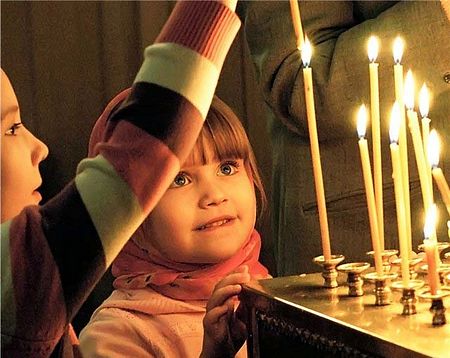We all are familiar with the Christmas song “Silver Bells.” City sidewalks, busy sidewalks, dressed in holiday style. In the air there’s a feeling of Christmas… Strings of street lights, even stop lights, blink a bright red and green, as the shoppers rush home with their treasures… See the kids bunch, hear the snow crunch, this is Santa’s big scene, and above all this bustle you’ll hear silver bells, silver bells, its’ Christmas time in the city.”
Well, for too many people, this song accurately reflects their understanding and reality of Christmas – the commercial and secular view of silver bells, busy sidewalks, and shoppers rushing home with their gifts.
For those of us who journey through the Christmas Fast and prepare to celebrate the holy feast of Christmas, though, we remember something radically and completely different. In contrast to the busy city sidewalks with all their noise and lights, we recall a quiet, humble setting, inside a little cave in Bethlehem. Shepherds in the fields see angels. Kings from the East follow a star. And animals surround the Virgin Mary and Joseph looking upon a manger at a newborn infant, as God Himself enters into this fallen world.
In contrast to the superficial commercialism of Christmas, which cheapens the significance of this holy day to a jolly old man in a red suit, or minimizes it solely to a beautiful family gathering, Christians worldwide pause and meditate on something fundamentally different. The most unbelievable event ever in the history of the world takes place! Almighty God acts in a unique and incredible manner. The Creator of the universe enters into His creation by becoming one of His creation, and He does this in the most humble, simple, quiet way.
St. Paul says in the Christmas Epistle, “When the fullness of time had come, God sent his Son, born of a woman, born under the law, in order to redeem those who were under the law, so that we might receive adoption as children.”
God has always acted in the world from the very beginning in a variety of ways – through the Old Testament patriarchs, through the Law of Moses, through the prophets, through holy men and women who talked about God. But a particular time came, when God said, “Now is the time for me to act in the most incredible manner – I will go and live among my people! I will epitomize for them divine love! I will show them how to live the most meaningful and abundant life. And then I will do the one thing that no one else would ever do. I will destroy the power of death from which all humankind suffers, and I will open up the doors of paradise for all those who choose to follow me!”
This is precisely the “good news of great joy” that the angels proclaimed to the shepherds. Our Father in heaven, the Almighty Lord, acted and changed the world forever. He showed in the most emphatic and dramatic way, “I have not forgotten you. I can never forget you, because I have created each one of you in the palm of my hand. You are my beloved children, and I have seen your pain, your sorrow, your difficulties and struggles, your despair, your great need, and the dilemma of death itself. Therefore, I have come to live among you, to live with you, to live in you. Will you accept me?”
This journey of seeing God live among us, of believing that He lives with us, and understanding that He desires to live in us, is the central message and journey of Christmas, which we should carry with us into the New Year and throughout our lives!
GOD LIVES AMONG US. One hymn we sing during Christmas matins said, “How was He, who cannot be contained in any way, contained in a Virgin’s womb? How can He, who is in the eternal bosom of the Father, be held in the arms of an earthly mother? Certainly, this miracle transpired because God condescended to become incarnate. He became one of us and shared in our nature, even though He was not of our nature, while never abandoning His divine nature.”
What an incomprehensible mystery to believe that the infinite and eternal God became a simple human being – a powerless child born of simple parents in a cave of Bethlehem. And yet He did this for each one of us!
So we can rejoice because we know God chose to live AMONG us.
But not only this, that He came to live AMONG us, but also HE CAME TO LIVE WITH US. The angel proclaimed to Joseph that His name would be “Emmanuel” which means “God is with us.” A central teaching of our Orthodox Christian faith is that while God came to earth, He did not stay distant from humanity. He was not born a powerful king in a mighty palace with high walls separating Him from His people. No, He was born in a simple family, raised in a poor village, and lived among His people. He lived with the poor, the simple, the humble, and the suffering. He tasted the common life of people, and lived with them. He completely participated and understood what our life is all about, because He tasted it Himself in the most humble manner.
So we can rejoice because we know we have a God who lives WITH us.
The most important point of Christmas, though, may be the final point. Yes, God lives among us. Yes, He lives with us. But most significant of all, GOD DESIRES TO LIVE IN US!
God came and yet people rejected Him, or ignored Him. King Herod heard of His birth and tried to kill Him. The religious leaders in Jerusalem heard about His birth and yet ignored him. The inn keepers and crowds in Bethlehem were simply too busy and preoccupied with their own concerns to realize who was in their midst. Don’t they represent so many of us today? So many of us who are too busy, too preoccupied with our own affairs, too interested in superficial cares instead of essential matters?
God desires to live in us, and yet He does not force His will upon anyone. In one way, each of us is more powerful than Almighty God. We can choose to keep the door of our heart closed, and not allow Him to enter in. Here lies the tragedy of human history over the centuries following that first Christmas morn.
So we can rejoice because we know that God desires to live in us!
And yet, a question we should all ask ourselves is this: Will each one of us open up our hearts in a manner we’ve never done before, and allow Jesus Christ to be born anew within us? Will we allow the baby Jesus to live in us and guide us each day of the New Year and throughout our lives? Will we allow our Lord and Savior to truly be our Lord and Savior, and will we allow Him to direct our lives and be in the center of our lives?
This is the central question we should all meditate upon this Christmas!
Let me conclude with a beautiful story which illustrates the essence of our Lord’s Birth!
In Russia, following the fall of communism, there was a state-run orphanage where 100 boys and girls lived under squalid conditions. With the freedom of religion came the opportunity for the Church to be more involved in these state institutions, and to bring such children the joy and good news of Christmas. A priest and some of his parishioners happened to go to this orphanage and share the Christmas Story with all the children. He told them about the Virgin Mary and Joseph in Bethlehem finding no room in the inn. How the holy family found refuge in a cave, where the baby Jesus was born, and how they placed Him in a manger among the animals.
Throughout the story, many children and even the orphanage staff sat in amazement as they listened to this story, probably for the first time ever. Some sat on the edges of their stools, trying to grasp every word. Completing the story, the people who came with the priest gave the children three small pieces of cardboard to make a crude manger, along with pieces of a napkin. Following instructions, the children tore the napkin and carefully laid strips in the manger for straw. A doll-like baby was cut from some other material.
The orphans busily assembled their manger as the priest walked among them to see if they needed any help. All went well until he noticed little Misha. Misha looked to be about 6 years old and had finished his project. As the priest looked at the little boy’s manger, he was surprised to see not one, but two babies in the manger. He thought the boy must have misunderstood the story and asked why there were two babies in the manger. The child, however, began to repeat the story very seriously. For such a young boy, who had only heard the Christmas story once, he related the happenings accurately – until he came to the part where the Virgin Mary placed the baby Jesus in the manger.
Then Misha started to ad-lib. He made up his own ending to the story as he said, “And when Maria laid the baby in the manger, Jesus looked at me and asked me if I had a place to stay. I told him I have no mamma or papa, so I don’t have any place to stay. Then Jesus told me I could stay with him. But I told him I couldn’t, because I didn’t have a gift to give him like everybody else did. But I wanted to stay with Jesus so much, so I thought about what I had that I could offer as a gift. I thought maybe if I kept him warm, that would be a good gift.
So I asked Jesus, “If I keep you warm, will that be a good enough gift?” And Jesus told me, “If you keep me warm, that will be the best gift anybody ever gave me.” “So, I got into the manger, and then Jesus looked at me and he told me I could stay with him, and that He would live in me – forever!!!”
















